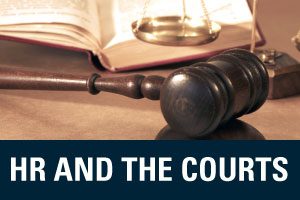HR and the Courts
 Each month, CUPA-HR General Counsel Ira Shepard provides an overview of several labor and employment law cases and regulatory actions with implications for the higher ed workplace. Here’s the latest from Ira.
Each month, CUPA-HR General Counsel Ira Shepard provides an overview of several labor and employment law cases and regulatory actions with implications for the higher ed workplace. Here’s the latest from Ira.
Biden Administration Issues Executive Order Calling on OSHA to Determine Whether There Is a Need to Issue Emergency Temporary Standards Protecting Workers From On-the-Job COVID-19 Infections
President Biden issued an Executive Order (EO) calling on the Occupational Safety and Health Administration (OSHA) and the Mine Safety and Health Administration (MSHA) to decide whether there is a need to issue temporary emergency standards to protect employees from on-the-job COVID-19 infections. The president stated, “I am calling for the enforcement of more stringent worker safety standards.” The president’s EO calls for OSHA to decide whether a temporary emergency standard is necessary. If OSHA decides that such a standard is needed, it should be issued by March 15. No deadline was given for an MSHA rule.
In order to justify an emergency rule, OSHA must conclude that “employees are exposed to grave danger” by a new hazard. Declaring such an emergency allows OSHA to avoid the lengthy public comment period which is attached to federal rule making. Under the Occupational Safety and Health Act, an emergency rule can stay in effect for six months, after which it expires unless it is replaced by a permanent rule. OSHA does not have jurisdiction of state and local workers. The EO also calls for OSHA to review its COVID-19 enforcement efforts and identify areas to improve.
Biden Administration Strikes Down Previous Trump Administration’s Controversial Diversity Training Order Applicable to All Government Contractors
On January 21, one day after his inauguration, President Biden rolled back the controversial Trump administration Executive Order (EO) which banned federal government agencies and contractors from providing “divisive” diversity training for workers. Accompanying this EO, President Biden also signed another EO underscoring the recent U.S. Supreme Court decision outlawing workplace discrimination on the basis of sexual orientation and gender identity.
The Trump administration EO brought into question standard employee training that, for example, expressed concern about unconscious discrimination.
U.S. Court of Appeals to Decide Whether Workplace Rumors of a Professor’s Sexual Relationship With a Student Rise to the Level of Actionable Hostile Environment Sexual Harassment
The U.S. Court of Appeals for the 10th Circuit (covering Colorado, Utah, Wyoming, New Mexico, Kansas and Oklahoma) recently heard oral argument over an appeal by a university professor who alleged hostile environment sexual harassment against the university as a result of numerous rumors among faculty and university administrators of his alleged sexual relationship with a student. His case was dismissed by the federal trial court, which concluded that the rumors did not qualify as discrimination based on sex. The professor appealed the dismissal to the Court of Appeals. (Thorpe v. University of Denver (10th Cir., No. 20-1069, oral argument 1/14/21)).
Courts of appeals for different circuits are split on whether rumors of sexual activity are actionable and create a hostile work environment. The case before the 10th Circuit will be a case of first impression, as it has not yet ruled on this issue.
High School Football Coach — in a Case Likely to Have Higher Ed Public School Ramifications — Argues That His Discipline for Refusing to Stop His Public Praying at the Conclusion of Each Football Game Violates His First Amendment Free Speech Rights
The applicable lower federal district court rejected the high school football coach’s First Amendment free speech/religion claim, and the U.S. Court of Appeals for the 9th Circuit (covering California, Oregon, Washington, Nevada, Idaho, Montana and Arizona) recently heard argument over the coach’s appeal. The coach argued that his kneeling and praying after each game at the 50-yard line was an expression of his sincere religious beliefs and to discipline him for it violated his Constitutional rights. (Kennedy v. Bremerton School District (9th Cir., No. 20-35222. Oral argument, 1/25/21)).
Judges for the 9th Circuit who heard argument over the appeal expressed skepticism about the coach’s claim that he was truly involved in a personal, private religious observance. The judges questioned whether the public comments made by the coach and his social media posts indicated that he urged players and the public to join him in these prayers, which arguably detracts from the argument that he was engaged in a personal, private religious observance.
U.S. District Courts to Test Audio Livestream of Selected Cases on YouTube
Thirteen U.S. district courts will test livestreaming audio of certain civil proceedings on YouTube as part of a two-year pilot program in the federal judiciary. The streaming will be in civil cases of public interest with consenting parties and excludes trials and proceedings involving jurors, witnesses and classified materials. The pilot program will also exclude criminal proceedings. Two of the participating courts have already begun livestream audio during the pandemic. The remaining courts will begin in February 2020. The Supreme Court, as well as 13 of the federal circuit courts of appeals, have been livestreaming oral arguments during the pandemic.


